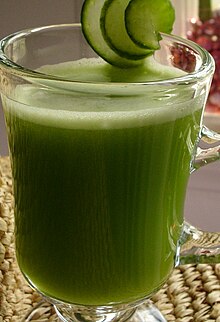– Home-made juice:
– Making vegetable juice at home can augment diets low in vegetables and fruits.
– Juicers separate juice from pulp fibers.
– Masticating juicers use a slow-geared grinding mechanism.
– Centrifugal force can be used as a cheaper and faster alternative.
– Masticating process is believed to protect vegetables from oxidation and heat.
– Varieties:
– Common commercial vegetable juices include carrots, beets, pumpkin, and tomatoes.
– Other popular items in vegetable juices are parsley, dandelion greens, kale, celery, fennel, and cucumbers.
– Lemon, garlic, and ginger are sometimes added for medicinal purposes.
– Asian cultures use Chinese yam sparingly in vegetable juices.
– Kale juice marketed as Aojiru in Japan is known for its health benefits.
– Nutrition:
– Vegetable juices are recommended as supplements to whole vegetables.
– 3/4 cup of 100% vegetable juice is equivalent to one serving of vegetables according to USDA guidelines.
– Drinking vegetable juice may reduce risks of Alzheimer’s disease.
– Vegetable juices may not be a sufficient primary mode of vegetable consumption.
– Some vegetable juices are high in sodium and sugar, so consumption must be monitored.
– See also:
– Juicing is related to vegetable juice consumption.
– A list of juices can provide more options for consumption.
– Raw veganism may include vegetable juice as part of the diet.
– References:
– “Nutrition Guide for Physicians” by Ted Wilson provides information on nutrition.
– A study by Ruxton, Gardner, and Walker explores the protective effects of fruit and vegetable juices against cancer and cardiovascular disease.
– Research by Qi Dai et al. suggests a link between fruit and vegetable juices and Alzheimer’s disease.
– Siener, Seidler, Voss, and Hesse discuss the oxalate content of fruit and vegetable juices.
– Shenoy, Kazaks, Holta, and Keena’s study shows that vegetable juice can help meet daily vegetable recommendations.
Vegetable juice is a juice drink made primarily of blended vegetables and also available in the form of powders. Vegetable juice is often mixed with fruits such as apples or grapes to improve flavor. It is often touted as a low-sugar alternative to fruit juice, although some commercial brands of vegetable juices use fruit juices as sweeteners, and may contain large amounts of sodium.

